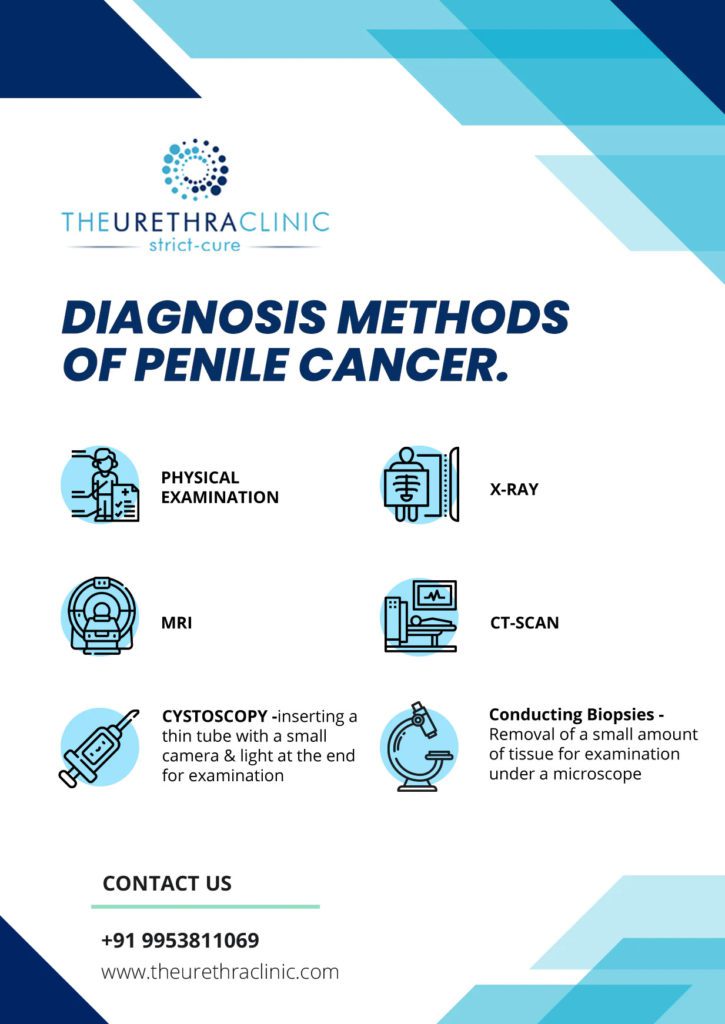Penile cancer or cancer of the penis is a condition where cancerous cells grow in the tissues of the penis. It is a rare type of cancer where only about 26,000 cases per year are diagnosed worldwide. The treatment depends upon the type of cancer and the stage of the disease.
Table of Contents:
Feel free to skip ahead if one topic catches your eye:
5. Treatment of penile cancer in Delhi
1.What is Penile Cancer?
- Penile cancer is cancer that starts in the penis, a part of the male urinary and reproductive system
- It commonly occurs in the area beneath the foreskin of the penis
- The type of penile cancer depends upon the type of cells involved.
- More than 95% of penile cancer cases come under the squamous cell carcinoma category
- About 10% includes other types such as basal cell, melanoma, and adenocarcinoma
- Diagnosis starts with taking a sample of the tissues(biopsy)
- Other tests include MRI, CT scan, PET- CT scan to assess the spread of the disease
Stages of Penile Cancer
The stage is important to decide on the treatment. The grading of penile cancer is as follows:
- Stage 0- The cancer is only found on the surface of the skin
- Stage 1- Spread to connective tissue below the skin
- Stage 2- Cancer has spread to the connective tissue below the skin, the tissue causing the erection, and one lymph node
- Stage 3- Spread extends to connective tissue, erectile tissue, urethra, prostate, and more than one lymph node in the groin
- Stage 4- Areas near the penis, lymph nodes in the groin, or distant parts of the body are involved.
Read Also: Male Reproductive System: Structure & Function
Signs and Symptoms
Mentioned below are the early signs of penile cancer
- A change in the color of the penis.
- Thickening of the skin in the penis.
- An ulcer on the surface of the penis that does not heal within four weeks
- Lump on the penile skin
- Wart-like growth on the penis
Some of the early symptoms include:
- A continuous foul-smelling discharge under the foreskin
- Pain at the tip or shaft of the penis.
- Flat, irregular bluish-brown lesions on the penis
- Marks below the foreskin.
- A velvety and reddish rash under the foreskin.
Late-stage symptoms such as:
- Fatigue
- Weight loss
- Abdominal pain
- Pain in the lower back
Do not ignore the penile cancer symptoms, when in doubt consult a specialist to stay informed
Read Also: Prostatitis: Symptoms, Causes, Diagnosis, Treatment & Risks
3. What causes Penile Cancer?
Though penile cancer causes have not yet been identified, certain risk factors such as age, smoking, poor hygiene, etc have been proven to increase the probability.
Can circumcision protect from it?
Circumcision is the process in which the skin covering the tip of the penis is surgically removed. This practice has existed since ancient times in various cultures. When the foreskin is tight and does not retract easily, smegma ( a combination of dead cells and oil) is formed under the foreskin. This increases the risk of penile cancer.
Circumcision to prevent penile cancer has been well-debated over the years. The process of circumcision prevents the formation of smegma and thus decreases a man’s chances of contracting the disease.

4. Risks and complications
Certain factors increase the risk of the disease. Staying away from these penile cancer causes may help prevent the disease to a certain extent. They include:
- Sexually transmitted infections such as the human papillomavirus (HPV)- men with multiple sexual partners are more prone (about 50%)
- Men over the age of 60
- Smoking increases the risk of penile cancer
- Certain skin diseases in and around the penis area
- Having a tight foreskin that does not allow free movement
- Uncircumcised men are found to have a higher incidence of penile cancer
- Poor genital hygiene contributes to the high risk
Complications of penile cancer:
If left untreated, it causes the following complications:
- A local wound that does not heal
- Fluid collection under the surface of the skin
- Death of the tissues of the penis
- Inflammation of the veins of the penis
- Spread to distant areas of the body
The diagnosis of cancer is common in partners of patients with cancer of the penis. Since HPV can be transmitted through skin contact or sexually, it is advisable to use a condom during sex.
Read Also: How to Perform Testicular self-examination?
The treatment will depend on the penile cancer symptoms and is influenced by
- Your age
- The stage of your cancer
- The efficiency of a certain treatment on the cancer area
- Quality of life following treatment
- The existing physical condition of your health
The treatment is based on the diagnosis. The diagnosis of penile cancer is done through:
- A tissue sample from the penis is taken and tested for cancer through biopsy
- Lymph node testing for the presence of malignancy
- Xray
- CT scan
- MRI
- PET- CT scan
The types of penile cancer treatment available are:
- Topical treatment if the cancer is on the surface of the skin
- Surgical removal of the malignant tissue depending on the extent and type of the lesion
- Laser therapy for early-stage cancers
- Cryotherapy that used liquid nitrogen to freeze and kill the cancerous cells
- Radiotherapy
5. Treatment of penile cancer in Delhi
If you are looking for penile cancer treatment in Delhi, Dr. Vikram Shah Batra’s The Urethra clinic is a great choice. Dr. Vikram is one of the best urologists in Delhi who specializes in men’s urology and male reproductive oncology ( cancers of the male reproductive system). He patiently listens to all your sensitive concerns, advises the best possible treatment for your condition, and offers the best penile cancer treatment options.
Takeaway
The Urethra Clinic is a surgical establishment imparting care and treatment for diseases of the urethra and the male sexual organ i.e penis. The treatment spreads out to complex urethral structures including many post-infectious, post-surgical problems, incontinence, penile and urethral reconstruction, to name a few. This facility is one of the few places that offers specialized services for penile issues and male reproductive problems. The expertise of Dr. Vikram, the best urology cancer specialist in Delhi in the diagnosis and treatment of penile cancers with the most advanced technology will make it the best choice for you.


